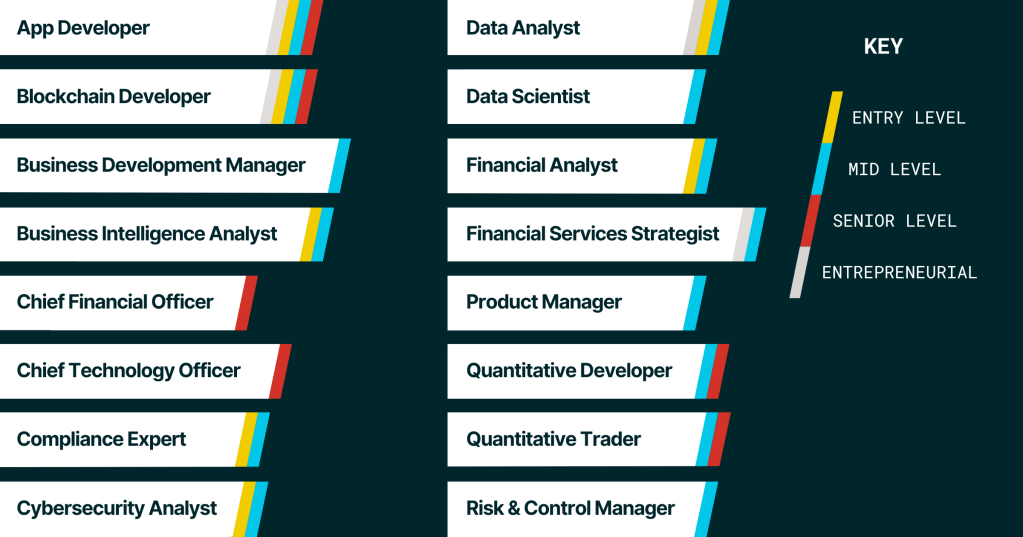Fintech, short for financial technologies, encompasses technologies that support or enable financial services. Among the most groundbreaking technologies are mobile payment applications, peer-to-peer lending, cryptocurrencies, blockchain technologies, and robo-advisors. As these technologies continue to advance and extend their influence, the demand for professionals with fintech skills is rising. If you’re passionate about finance and technology and dream of reshaping how individuals and organizations manage their money, then the fintech sector is an ideal fit for you.
Not convinced yet? Here are a few facts to give you an idea of what the industry offers and where it’s heading.

Let’s review this skill set together by discussing how fintech expertise can be acquired, applied, and transformed into a fulfilling career.
What can I do with fintech skills?
There are many directions you can take a career in fintech. Typical responsibilities of fintech professionals include building and utilizing technologies in addition to analyzing their outputs to make informed decisions. The common thread is that fintech professionals work with financial technologies.
One strategy for navigating the wide fintech landscape is to focus on technologies that interest you. Let’s explore a few popular technologies you could use if you acquire fintech skills.
Artificial intelligence (AI) — While AI is still in the early stages of adoption in some industries, fintech companies have been using AI in the form of machine learning algorithms for years. Common uses of machine learning include analysis of transactions, detection of fraud, and financial forecasting.
Cybersecurity technologies — With the increase in digital financial transactions and services, cybersecurity has become a significant concern. Fintech companies invest heavily in protecting customer data and financial assets.
Blockchain technologies — Blockchain technologies, which utilize distributed ledger technology to maintain records on a network of computers, have gained a lot of traction in the fintech sector. Popular applications include cryptocurrencies, digital tokens, and smart contracts.
Insurtech — Insurtech, short for insurance technology, utilizes technology to enhance and streamline the insurance industry. It is changing how insurance products are designed, underwritten, sold, and managed.
Mobile payment apps — These applications facilitate financial transactions using a mobile device. Examples include PayPal, Venmo, and Apple Pay.
Regtech — Regtech, short for regulatory technology, refers to technologies that help financial institutions comply with regulatory requirements. Key aspects of regtech include data management, risk assessment, automation, and real-time monitoring.
Robo-advisors — Robo-advisors use algorithms and AI to provide automated investment advice.
Play the clip below to hear Eric Cadena, a data scientist, explain how his fintech skills have proved useful across several industries.

I was at a small start up doing finance work.
And then after that, when I transitioned to the consulting company, I, wasn’t deployed into finance anymore.
The skills were very much useful and could be agnostic to any field. So I was able to get into.
Material and chemical sciences field and then right now I’m actually in oil and gas and essentially the energy field.
And again all my skills applicable even the finance side of times because I have to worry about managing the finances of a project and all that.
So. By and large, the skills are still very useful.
Discover your career opportunities
Building and managing fintech products and companies requires a diverse range of expertise and skill. You’ll find that this diversity is reflected in the array of job titles you’ll encounter within the fintech industry. Below are a few job titles to consider:.

Expert advice
“Breaking into the fintech industry can feel like a tough nut to crack. Networking is your secret weapon — attend industry events, join online communities, and connect with professionals for insights and opportunities. Persistence, flexibility, and a proactive approach will get you there.”
— Irene Tirella, career expert at edX

How can I acquire fintech skills and turn them into a career?
If you are interested in pursuing your own career in fintech, we recommend taking these steps:
Research is key in any career, and a career in fintech is certainly no exception. Take advantage of all the information available, whether browsing the internet for job titles, listening to tech-relevant podcasts, or getting connected to professionals in the areas or positions that interest you.
Pro tip:
Explore your career possibilities. As part of your research, take every opportunity to learn more about topics in your desired field. Browse the edX course catalog at edx.org to see what fintech-related topics, courses, and programs interest you, and start building your fintech skills today.
One key part of the research phase is networking. This simple step is often overlooked and undervalued but can significantly impact your career trajectory. To clarify your career goals and aspirations, you must talk with professionals about what the work looks like.
You open a door of opportunity in your career by reaching out to professionals in your targeted fields, positions, and companies. Connecting with fintech professionals who could vouch for you and provide hard-to-find intel about the industries or organizations of interest is invaluable.
Pro tip:
We highly recommend scheduling informational interviews to learn from and connect with fintech professionals and hiring managers to gather information. These contacts can help you learn new skills, offer advice, and share job opportunities.
Check out our Networking Guide and Outreach Templates and Resources for help getting started.
To supplement your understanding of what others are doing professionally, gain clarity on your goals and aspirations. Ask yourself what about fintech interests you — the possibilities are endless.
Your career goals may necessitate primarily finance skills, primarily technology skills, or a blend of both. Below is a list of in-demand skills within each category.
Finance skills
- Financial analysis
- Financial modeling
- Financial ratios
- Financial trading fundamentals
- Forecasting
- Risk management
Technology skills
- Blockchain
- Cybersecurity
- Data analysis
- Data visualization
- Machine learning
- Python
- SQL
Pro tip:
To better understand which skills you may need to achieve your career goals, we recommend exploring job postings. Take note of the technologies and skills commonly included in job posts that interest you. These are likely the skills that you need to acquire.
When it comes to acquiring fintech skills, you have numerous options. We recommend selecting a path that aligns best with your needs and learning style. Here are a few options to consider:
Self-education — If you are looking to learn asynchronously, informally, or casually, self-education is a great place to start. Many approaches to self-education support various career goals, budgets, learning styles, and time commitments. Here are some ways to self-educate:
- Informal opportunities: Gain a greater understanding of the industry by reading. Explore books, articles, and even research papers to expand your fintech knowledge and learn what’s happened or is happening in the field. Not a reader? Plenty of videos, podcasts, and other forms of multimedia can teach you a thing or two about careers or work related to fintech.
- Online Courses: If you prefer a more structured or socialized learning experience, online courses might be a good option. edX.org offers several instructor-led and self-paced courses that may be of interest.
- Professional certifications: When you want a less casual learning experience, but don’t have needs that warrant a boot camp or degree, professional certifications may be the best fit for you. Professional certifications are a great addition to your resume and prove your technical skills for roles in fintech. edX.org offers many certificate programs that may interest you.
Boot camps — Experienced curriculum teams design these innovative programs to help you achieve your career goals in a fraction of the time it takes to complete a traditional degree. With many boot camps lasting just 3-12 months, you’ll be amazed at how quickly you can gain the knowledge and expertise you need to launch your dream career. Explore popular fintech boot camps on edX.org.
Degree programs — A degree in finance, business, computer science, or data science sets a strong foundation for a career in fintech. A degree can be especially helpful if you are pursuing mid-level or senior level roles, such as Data Scientist or Product Manager.
If you decide to focus on technical roles in the fintech industry, it is important to note that the technical hiring process is different from those of non-technical fields in two ways:
- Many employers require a portfolio of projects, such as course projects, personal projects, and professional projects. You’ll want to build a competitive online portfolio highlighting your skills and unique value.
- Many technical hiring processes involve a technical screening. This is a stage in the interview process where the employer assesses a candidate’s technical skills. They might sound intimidating at first but remember that the employer wants you to succeed. They hope to find a great candidate, and that candidate could be you.
Helpful resources:
The career team at edX has resources and workshops to help you fine-tune your application materials and prepare for technical interviews. Start with our Technical Screening Guide.
Once you achieve your fintech career goal, celebrate your success. The career journey is full of ups and downs; every victory deserves acknowledgment.
With that said, your journey doesn’t end here — it’s only just beginning. Give yourself grace and understand that careers are not linear. Here are some ways you could continue growing your fintech skills.
Continued learning — Always reference our course catalog on edX.org for continued learning opportunities. It never hurts to brush up on your skills, expand your knowledge within the industry, or learn about other subjects that could apply to your work, interests, or something in between.
Promotions — As the fintech industry grows, so will career opportunities. To position yourself well for promotions, you will need to stay current on fintech technologies and trends and develop leadership skills.
Promotions in fintech:
Here are a few senior roles you may want to work toward as you advance your career in fintech:
Chief financial officer — Oversees an organization’s financial activities, including financial planning, budgeting, reporting, and risk management.
Chief technology officer — Oversees an organization’s technological vision, strategy, and direction.
Quantitative developer — Creates and maintains software systems and algorithms used in quantitative finance and trading.
Pivots — Make sure to regularly check in with yourself and your satisfaction with daily tasks. If you are dissatisfied in your current role, take stock of what you like and dislike about it, keep your eyes out for company-sponsored growth opportunities, and pursue career pivots that optimize your background, skill set, and interests.
What could my career look like with a fintech skill set?
It is difficult to say exactly what your life would look like with a fintech skill set, but we can provide some insight. Consider how these may factor into your life plan:
Innovative work — Fintech has a reputation as a disruptive sector because fintech professionals are constantly developing new solutions to reshape financial services. A career in fintech presents opportunities to work on cutting-edge projects and reimagine old models.
Interdisciplinary roles — Roles in fintech often require a blend of finance and technology skills. If you enjoy participating in both worlds, then fintech is the right place for you.
Global impact — Mobile payment applications, cryptocurrencies, and other fintech innovations are extending the reach of financial services. The fintech sector has the opportunity to transform financial access worldwide, making it an exciting and impactful field to work in.
Expert advice
“On any given day, I’ll be working on several tasks or projects concurrently. So I could be doing anything from analyzing a fixed income trade that just hit the desk, testing out AWS deployment for an internal cash flow modeling program, gathering records for a ratings agency — every day is different.”
– Laramie Dunlap, data analyst

What are my next steps?
Learn more about fintech:
Register for a course on edX to learn about a variety of topics within the field of fintech, such as Introduction to Fintech, Fintech: Overview of the Fintech Sector, and Fintech: AI and Machine Learning in the Financial Industry.
Watch a session
Watch a relevant session on our Events page to learn more about the industry and other professionals’ experiences within it.




